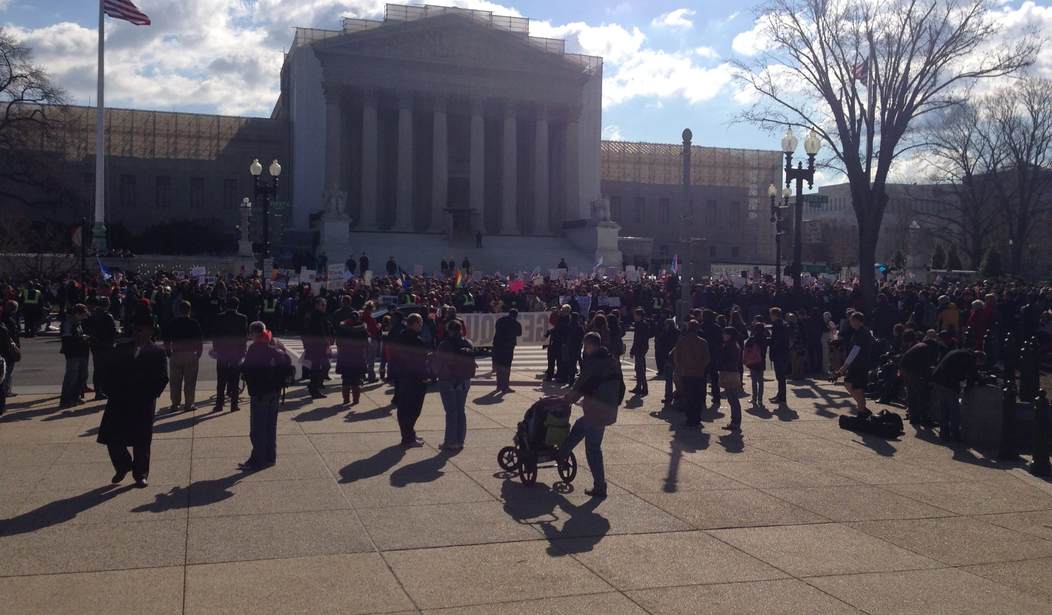WASHINGTON – Wednesday oral arguments concluded two days of presentations before the Supreme Court on the right of gay and lesbian couples to marry and receive the same benefits provided to heterosexual couples.
Protesters gathered for a second day of rallying outside of the Supreme Court for the arguments Wednesday about the Defense of Marriage Act (DOMA).
Aside from a small – and seemingly ubiquitous – contingent from the Westboro Baptist Church, supporters of DOMA were hard to find among the diverse crowd assembled in front of the Supreme Court. There were fewer people at the demonstration, which still numbered in the thousands, and no counter rally by opponents of same-sex marriage was planned for Wednesday.
Overall, the rally continued in the same spirit as Tuesday. Both rainbow and American flags waved vigorously in the windy conditions in the nation’s capital, as some people danced to fend off the cold, while others stood silently close to the podium waiting for the day’s program to begin.
Not everyone at the rally was there exclusively to demonstrate against DOMA. Ian Finkenbinder, an organizer and writer based in Seattle, was handing flyers to raise awareness for Dan Choi’s trial on Thursday. Choi faces federal charges for chaining himself to the White House to protest “Don’t Ask, Don’t Tell.”
Finkenbinder, who was discharged from the military in 2005 after announcing to his superiors that he was gay, said he thought there was a chance that DOMA could be struck down.
“There are a lot people here who are every excited about their cause and I’m excited for them, and I hope that they get the verdict that they want,” he said.
Tyler Bowman, a junior in college, and perhaps the only person at the rally wearing a T-shirt with a message in favor of the 2nd amendment, said that he was there to let people know that not all gay people are Democrats.
“Many of my friends in college who are gay are also either Republican or libertarian,” said Bowman.
When asked about his thoughts on the possibility of a pro-gay marriage Republican presidential candidate, he said that as much as he would like to see this, he does not believe it will happen for the 2016 election.
“We’ve seen many conservatives come out in support. It’s inevitable that the majority of Republicans will at one point support same-sex marriage, but I think it’s too soon to expect the entire party to change its stance on the issue,” said Bowman.
Tyler Deaton, secretary of the New Hampshire Young Republicans, spoke to attendees about the need to repeal DOMA, saying the issue is quickly gaining support from young conservatives.
“I’m happy to be here as a representative of a new generation of conservatives who are supporting the freedom to marry,” said Deaton. “As a conservative I will tell you, DOMA reeks of big government. It treads on individual rights and it treads on the rights of families.”
“Republicans, Democrats, and Independents are uniting all across the nation to make equality a reality, and we won’t stop until every single gay and lesbian in America has the right to marry the person they love without big government getting in the way,” he continued.
A ruling is expected by the end of June on the constitutionality of DOMA saying that marriage is defined as only between one man and one woman. The legislation passed Congress with overwhelming support and President Clinton signed it into law in 1996.
Under the law, Social Security, bankruptcy and pension benefits, along with family medical leave protections and other federal marriage benefits, do not apply to gay and lesbian couples legally married in states that recognize same-sex unions.
Edith Windsor, the 83-year-old plaintiff who is challenging DOMA, said she felt respected in the court and that she expects the outcome of Wednesday’s court hearing to be positive.
Windsor married her partner, Thea Spyer, in Canada in 2007. Spyer died two years later and left her estate to Windsor, who faced an immense estate tax because DOMA does not allow gay spouses to transfer wealth tax-free.
Not everyone shared Windsor’s optimism after the conclusion of the oral arguments.
After the hearing, Rev. Robert L. Schenck, chairman of the Evangelical Church Alliance, a group that filed a brief in the case and represents thousand of civilian and military members of the clergy, told reporters that the religious liberties of the clergy and the definition of marriage are both at risk.
“While we stand for the defense of marriage as between one man and one woman, it is quite clear that that definition at the federal level is at great risk,” he said.
Schenck said he fears that the religious freedom of military chaplains and other clergy could be violated if DOMA is struck down and they are required to recognize same-sex unions.
“We have urged this court to take into consideration and explicitly guarantee the religious freedom of military chaplains, civilian chaplains who are under orders from the federal government, and other clergy who are required by law to swear an oath and uphold the constitution,” said Schenk.
After Wednesday’s presentation, Windsor said she felt “uplifted” and “humbled” to hear justices question lawyers about her case.
She reflected on how much times had changed since she met Thea in 1963.
“I am today an out lesbian who just sued the United States of America,” she said. “I’m speaking to you guys freely. I’d have been hiding in a closet 10 years ago.”









Join the conversation as a VIP Member